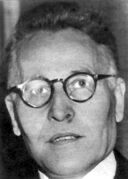Vilho Annala
Vilho Annala | |
|---|---|
 | |
| Minister of Transport and Public Works | |
| In office 4 January 1941 – 5 March 1943 | |
| Preceded by | Karl-Erik Ekholm |
| Succeeded by | Toivo Ikonen |
| Personal details | |
| Born | Vilho Annala January 17, 1888 Lapua |
| Died | July 28, 1960 (aged 72) Helsinki |
| Citizenship | Finnish |
| Political party | Lapua Movement, Patriotic People's Movement |
| Spouse | Inez Mirjam Wink |
| Alma mater | University of Helsinki |
| Profession | Professor |
Vilho Annala (17 January 1888 – 28 July 1960) was a Finnish civil servant, economist and far right politician.
Early years
Annala was born in Lapua, and first came to prominence as a student at the University of Helsinki, where he edited the student union newspaper Ylioppilaslehti from 1916 to 1919.[1] He went on to work for the Bureau of Statistics, whilst serving on the editorial staff of the conservative daily Uusi Suomi.[1] He gained a doctorate in 1932 and became one of Finland's leading civil servants.[1]
Politics
Annala joined the Lapua Movement and became Helsinki District Chairman in February 1931.[1] Ideologically Annala was heavily influenced by the corporatism of Italian fascism.[2] He supported the co-opting of the working classes into the Lapua Movement and opposed the influence of wealthy industrialists.[1]
In April 1932 Annala joined Herman Gummerus and Erkki Räikkönen in founding the Patriotic People's Movement (IKL) and he served as caucus chairman from 1936 to 1944.[1] Between 1933 and 1945 he also represented the party in the Parliament of Finland.[1] Whilst the official leader was Vihtori Kosola real control of the movement rested with Annala and his close lieutenant Bruno Salmiala.[3] It was Annala who dictated the policy of the movement although his hard-line views led to condemnation by both the government and the Evangelical Lutheran Church of Finland that damaged the group.[1] Annala held the post of Minister of Transport in the unity government of Johan Wilhelm Rangell from 1941 to 1943.[4] This however was a last throw for the IKL as the group faded soon afterwards and Annala left politics.[1]
Later years
With his political career over Annala became an academic back at the University of Helsinki.[1] He served there as the professor of political economy 1951–57.[5] He died in Helsinki, aged 72.
References
- ^ a b c d e f g h i j Philip Rees, Biographical Dictionary of the Extreme Right Since 1890, 1990, p. 11
- ^ P. Davies & D. Lynch, Routledge Companion to Fascism and the Far Right, 2002, p. 196
- ^ F.L. Carsten, The Rise of Fascism, London: Methuen & Co, 1974, p. 168
- ^ Roger Griffin & Matthew Feldman, Fascism: The "Fascist Epoch", 2004, p. 174
- ^ UNIVERSITY OF HELSINKI TEACHER AND CIVIL SERVANT CATALOGUE 1918-2000
- 1888 births
- 1960 deaths
- People from Lapua
- People from Vaasa Province (Grand Duchy of Finland)
- Patriotic People's Movement (Finland) politicians
- Ministers of Transport and Public Works of Finland
- Members of the Parliament of Finland (1933–36)
- Members of the Parliament of Finland (1936–39)
- Members of the Parliament of Finland (1939–45)
- Finnish civil servants
- Finnish economists
- University of Helsinki alumni
- Academics of the University of Helsinki
- Finnish professors
